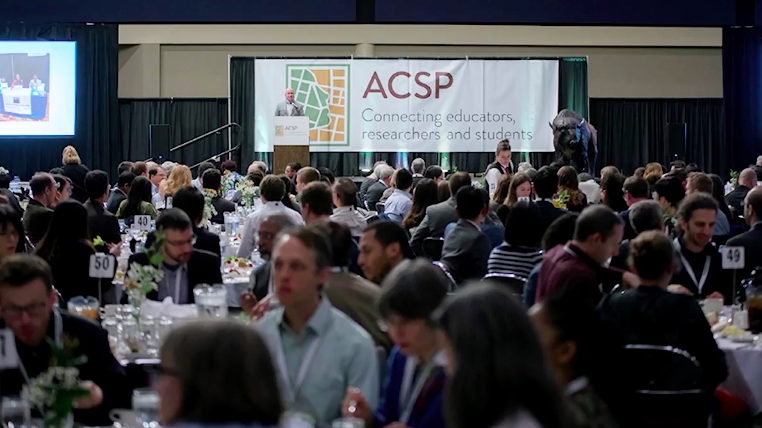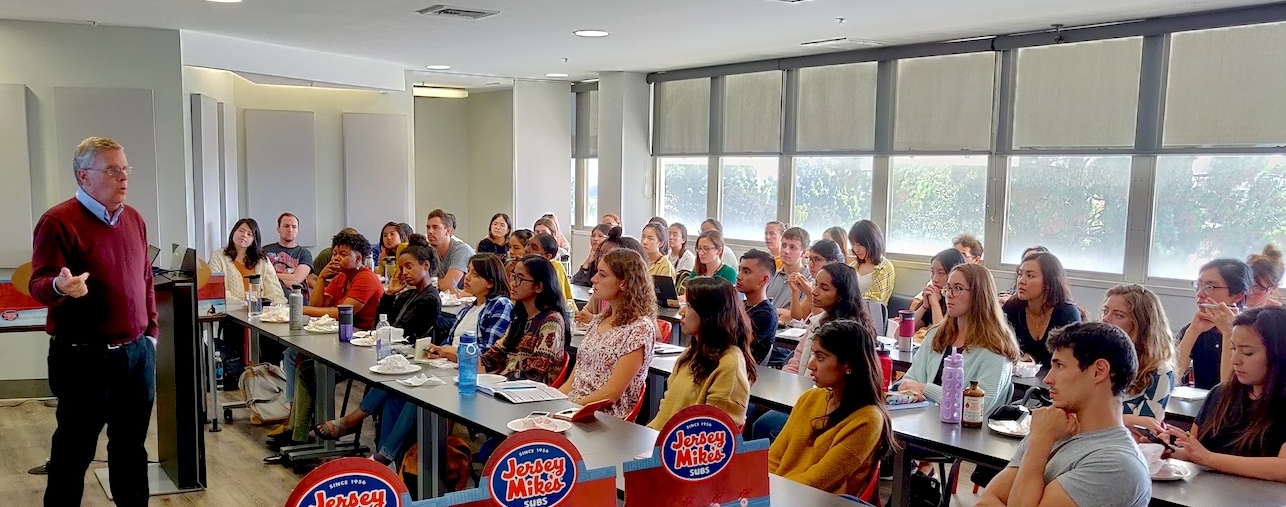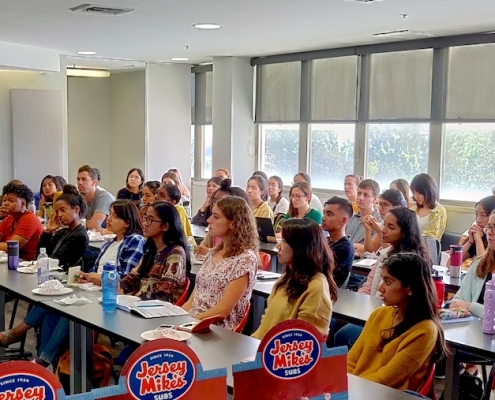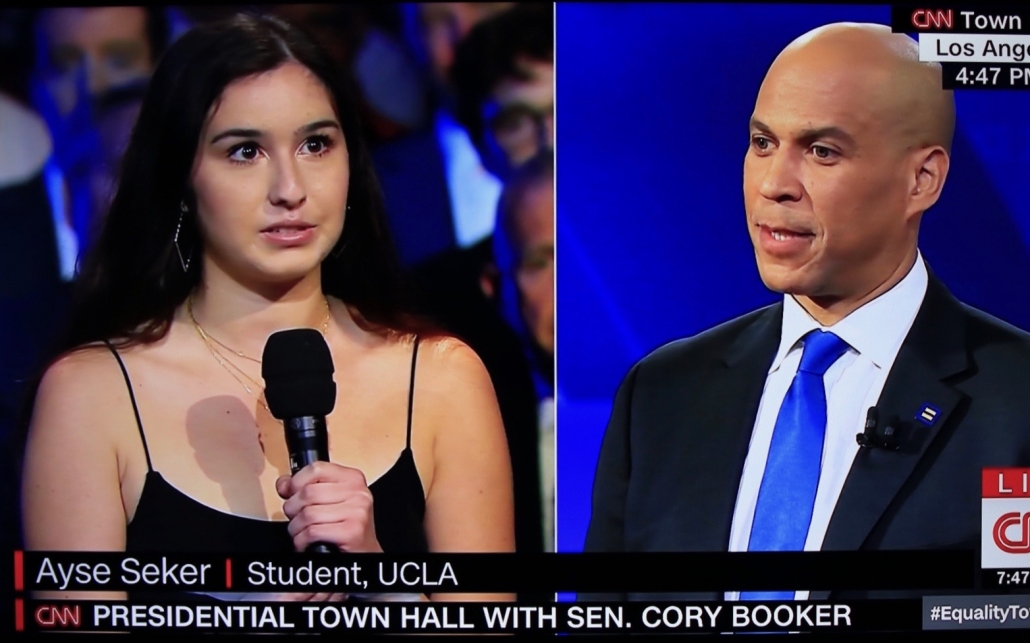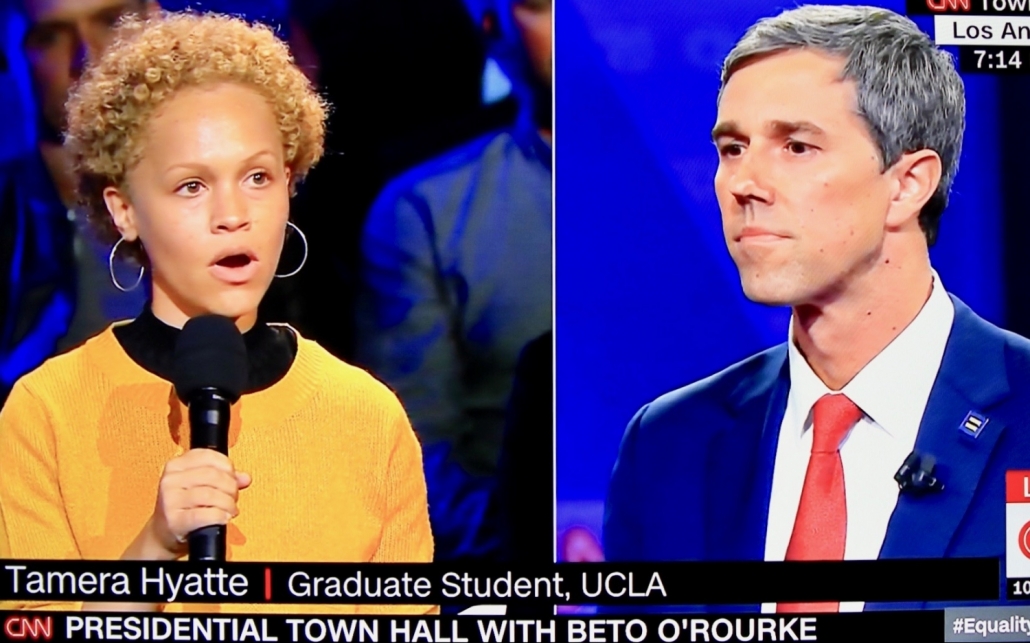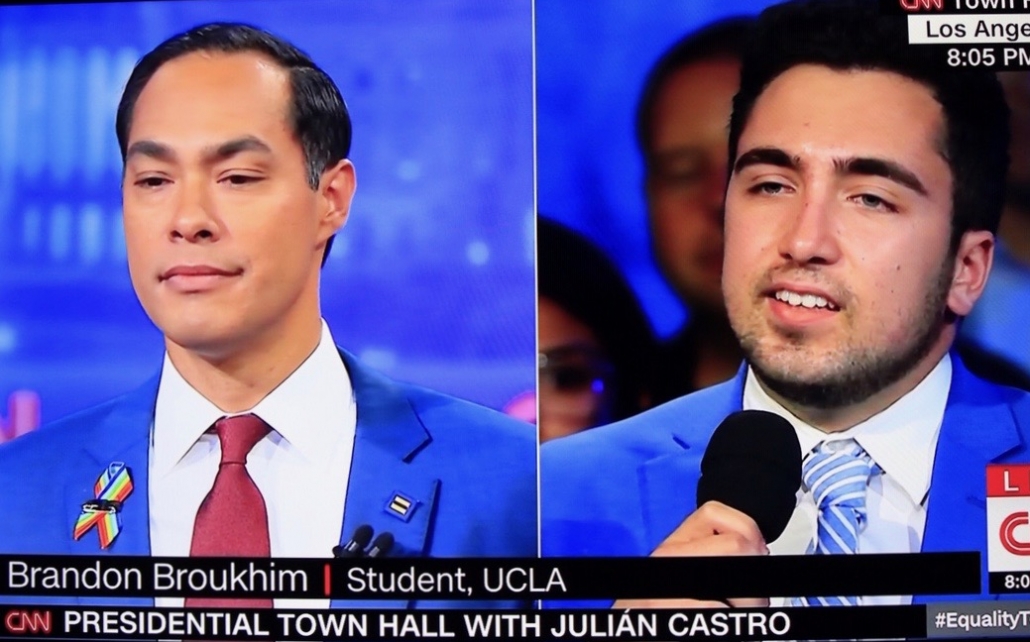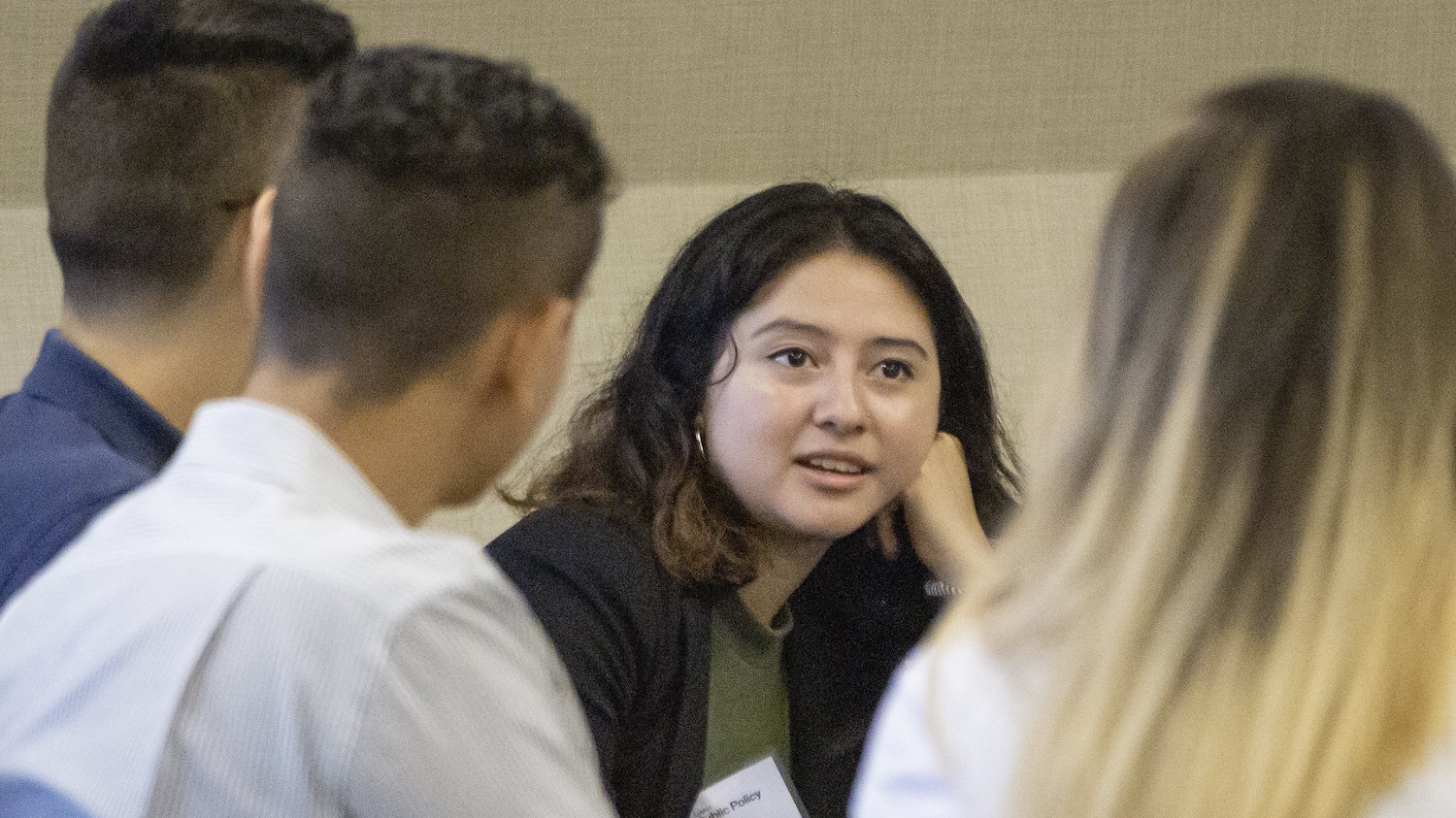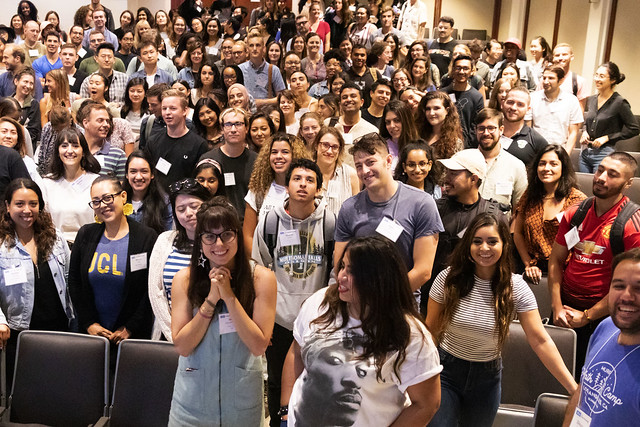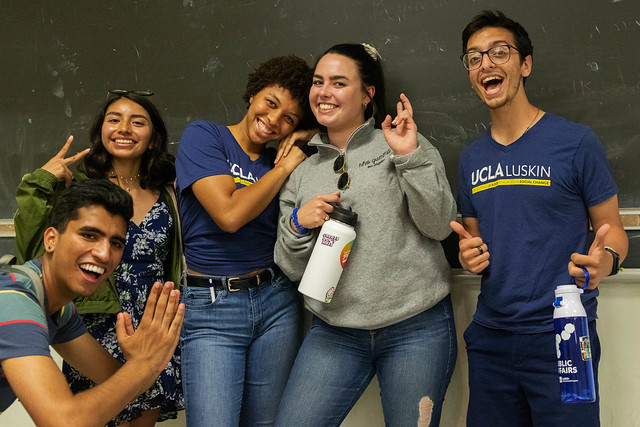ACSP Honors Umemoto for Leadership, Integrity, Solidarity
The Association of Collegiate Schools of Planning (ACSP) has honored Urban Planning Professor Karen Umemoto as the winner of the 2019 Marcia Feld Award for Outstanding Leadership. At the group’s annual conference, held Oct. 24-27 in Greenville, South Carolina, the ACSP honored faculty and students who have distinguished themselves or made major contributions to the planning profession. Every other year, the Marcia Feld Award recognizes a Faculty Women’s Interest Group colleague for outstanding leadership within the ACSP organization. “Quietly, with great talent and courage, [Umemoto] made an indelible mark on the organization and its ability to respond to the challenge of diversity,” said the awards committee, which described her as a “beacon of integrity and solidarity and an agent of positive change.” Although Umemoto was unable to attend the conference, she expressed her gratitude for the award and commented, “Each generation lifts up the next, and I’m very grateful to so many people who have helped me both professionally and personally.” Umemoto said she hopes that the award elevates the importance of research on diversity. A recent UCLA Luskin graduate was also recognized at the conference. Esteban Doyle MURP ’19 received the 2019 Ed McClure Award for Best Master Student Paper, which recognizes superior scholarship in a paper prepared by a master student in an ACSP member school. Doyle’s paper, “The Unequal Dangers of Walking to School,” presented a quantitative analysis of child pedestrian and bicycle crashes in Los Angeles and related their occurrence to neighborhood and built environment characteristics.
Remembering Zeke Hasenfeld’s Intellectual Generosity
Former colleagues, students and friends of Yeheskel “Zeke” Hasenfeld gathered at the Annenberg Community Beach House in Santa Monica on Oct. 11 to honor his life and reflect on the profound influence the professor emeritus had on those around him. Hasenfeld passed away on Feb. 28, 2019, leaving a legacy as a generous mentor, gifted communicator and a pioneer in the study of human service. After three decades at UCLA, Hasenfeld retired in 2014 but remained connected as a researcher and mentor. Among those who spoke at the memorial was Professor Laura Abrams, chair of UCLA Luskin Social Welfare, who has “fond memories of Zeke, who graced the halls of UCLA with his kindness and the rare intellectualism that made him a true social work legend.” Fernando Torres-Gil, professor of social welfare and public policy, remembers Hasenfeld’s infectious joie de vivre and a sense of life that never wavered. In remembrances shared during the memorial, former colleagues recalled his penchant for challenging them intellectually over the years, and former students expressed their gratitude for Hasenfeld’s deep trust in the capacity of students to do good work that matters. Several speakers at the memorial noted Hasenfeld’s devotion to family, and the pleasure he took in talking about his children and grandchildren. One of his daughters, Rena Garland, thanked the Luskin School for hosting the memorial, saying it gave her a deeper understanding of her father’s academic research and accomplishments. Also speaking at the memorial from UCLA Luskin were Professor Emeritus A.E. “Ted” Benjamin, Professor Emerita Aurora P. Jackson and alumna Sara Terrana, as well as other former colleagues and students who came forward to share memories at the memorial. Thomas Brock, a former student of Hasenfeld at the University of Michigan, and Michalle Mor Barak, a professor at USC and personal friend of Hasenfeld, attended the memorial and offered their remarks, and video tributes were provided by four other former students and colleagues.
A memoriam to Hasenfeld’s life and career can be found here.
View a Flickr album of the memorial.

Students Reflect on International Summer Fellowships
Global Public Affairs (GPA) at UCLA Luskin provided financial support and helped secure placements for eight graduate students to work in low- and middle-income countries this past summer. Student placements spanned the globe, from as close as Mexico City to as far as Dar es Salaam, Tanzania. Olivia Miller, a second-year MSW candidate, spent the summer in Bogota, Colombia, conducting fieldwork related to transgender rights, including help in organizing the grassroots Trans Pride March. “I decidedly spent [my] first weeks dedicating myself to a contributive role, recognizing the chaos of the march preparation, and putting at the center the development of my relationships with the social justice activists on the frontlines of this movement,” she wrote on the GPA blog. Urban Planning students who participated in the summer International Practice Pathway (IPP) program gained experience in transportation and infrastructure. Liliana Morales, a 2020 MURP candidate, interned with the planning department at the Ministry of Mobility in Mexico City. “I feel incredibly fortunate to have worked with professionals that are passionate and dedicated to mobility justice,” she wrote. “Mexico City is working toward improving quality of life, reducing social inequalities, diminishing gas emissions and increasing productivity through a comprehensive system that guarantees decent and safe trips for all residents.” GPA, led by Professor Michael Storper and associate director Stephen Commins, is already getting ready for its next cohort of IPP fellows, as more than 60 new UCLA Luskin students attended the fall 2019 orientation lunch. — John Danly
Read more about students’ summer fellowships on the GPA blog.
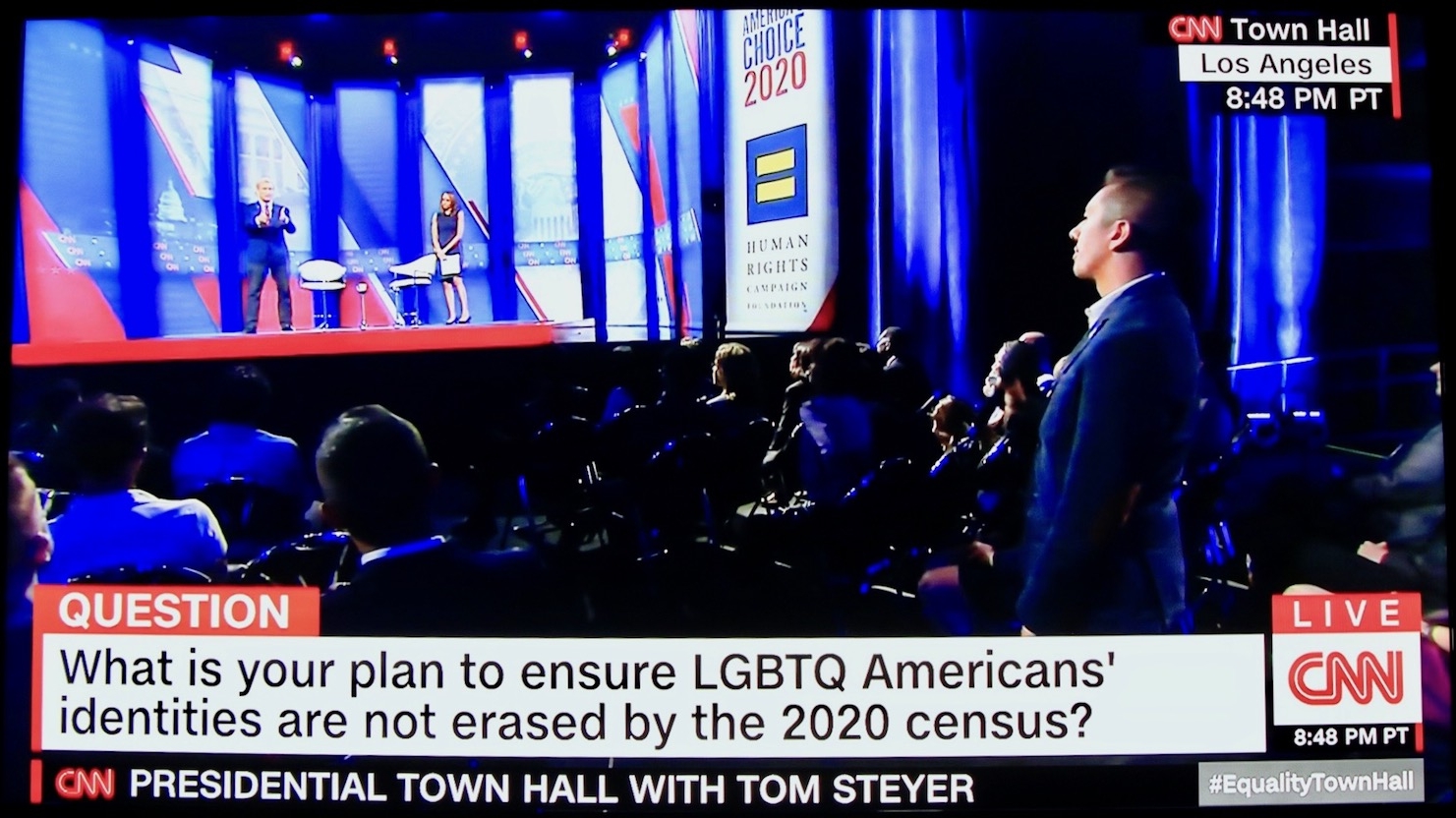
Face to Face With Would-Be Presidents
A large UCLA Luskin contingent came face to face with a field of Democratic presidential candidates at a town hall in downtown Los Angeles that focused on LGBTQ rights. Students, faculty and staff from the School were among 160 UCLA guests invited by the Human Rights Campaign Foundation, sponsors of the “Power of Our Pride” event broadcast live by CNN on Thursday, Oct. 10. Public affairs pre-major Ayse Seker was one of several students and staff selected to pose questions to the candidates. “How would you address the at times juxtaposing issues of religious freedom and LGBTQ rights?” Seker asked of candidate Cory Booker. Citing his own faith, Booker replied that he could not allow religion to be used as a justification for discrimination. Other staff and students invited to address the candidates included undergraduate Brandon Broukhim, public policy graduate student Tamera Hyatte and Kevin Medina, experiential learning advisor for the undergraduate program in public affairs. Candidates present at the forum included former Vice President Joe Biden, Mayor Pete Buttigieg, former Secretary Julian Castro, Sen. Kamala Harris, Sen. Amy Klobuchar, former Congressman Beto O’Rourke, investor and activist Tom Steyer and Sen. Elizabeth Warren. The town hall, held on the eve of National Coming Out Day, marked the first time a major cable news network aired a presidential event devoted to issues of importance to the LGBTQ community.
Public Policy Hosts Weekend of Learning and Service
About 30 undergraduate students from California and beyond convened at UCLA for a weekend of learning and public service, part of the not-for-profit Public Policy and International Affairs (PPIA) program. UCLA Luskin Public Policy hosted the program, “Advancing Social Justice Through Public Service: Lessons From California,” with senior lecturer Kenya Covington coordinating a full weekend of lectures, conversations and off-campus experiences. Students ventured out to MacArthur Park west of downtown Los Angeles, the Crenshaw District and the office of Los Angeles County Supervisor Sheila Kuehl to hear how policymakers are grappling with homelessness and gentrification. They heard from several MPP alumni from both the policy field and academia, and learned about public service career paths from Dean Gary Segura and other UCLA Luskin staff. Several members of the public policy and urban planning faculty shared research, insights and data-gathering techniques during the Oct. 4-6 event, including Amada Armenta, Kevin de León, Michael Lens, Michael Stoll and Chris Zepeda-Millán. Public Policy Chair JR DeShazo encouraged the students to engage intellectually, socially and emotionally as they explored policy challenges and prepared to make an impact in their own careers. The students formed working groups to synthesize what they had seen and heard, and presented their findings at the close of the program. Joining the large contingent of students from four-year and community colleges in California were participants from Arizona, Illinois, Michigan and Washington. The public service weekend was one of several outreaches around the country that are coordinated through PPIA to promote diversity in public service.
View photos from the PPIA public service weekend on Flickr.
We Host, We Toast, We Boast (Just a Little)
A larger turnout than anyone could remember showed up for the 9th annual Block Party in late September to help UCLA Luskin kick off another academic year. The event-filled week also included the annual Orientation for new graduate students, and an open house and information session for undergraduates. Staff volunteers from throughout the School provided helping hands and welcoming smiles to assist Director of Events Tammy Borrero in creating a Block Party to remember. Before he introduced Renee Luskin to lead a toast to the School’s 25th anniversary, Dean Gary Segura reminded the enthusiastic crowd that 2019-20 not only marks UCLA’s 100th anniversary, but it’s also a year of milestones at UCLA Luskin. “We have a lot to celebrate tonight,” Segura said. “We celebrate our founding as the UCLA Luskin School of Public Affairs — we’ve been in existence 25 years, but our mission has lasted a lot longer. In Public Policy last year, we celebrated some 20 years in existence. Later this year, we’ll celebrate the 50th anniversary of Urban Planning. And this is the 72nd year of operation of UCLA Social Welfare. Together, we have sent 8,000 alumni into the world to do good things.” A large contingent of those alumni were on hand at the Block Party, and you can view their pictures along with photos of the entire UCLA Luskin community on our Flickr feed or by clicking through the individual galleries below.

MSW Team Hits the Streets to Support Suicide Awareness
A team of faculty, students and friends of UCLA Luskin Social Welfare took to the streets over the weekend to raise funds for the Didi Hirsch Suicide Prevention Center. The team joined the Alive & Running 5K, which took runners and walkers on a course near LAX on a cool Sunday morning. Social Welfare field faculty member Laura Alongi Brinderson, who specializes in mental health issues among children, adolescents and their families, organized the team. The race marked Suicide Prevention Awareness Month, established as a time to share resources and start conversations about the taboo topic. In addition to providing services to people across the nation who have thought about, attempted or lost someone to suicide, the Didi Hirsch Center trains more than 20,000 people each year — including LAPD SWAT teams, the FBI, firefighters and other emergency responders — how to recognize and respond to warning signs.
